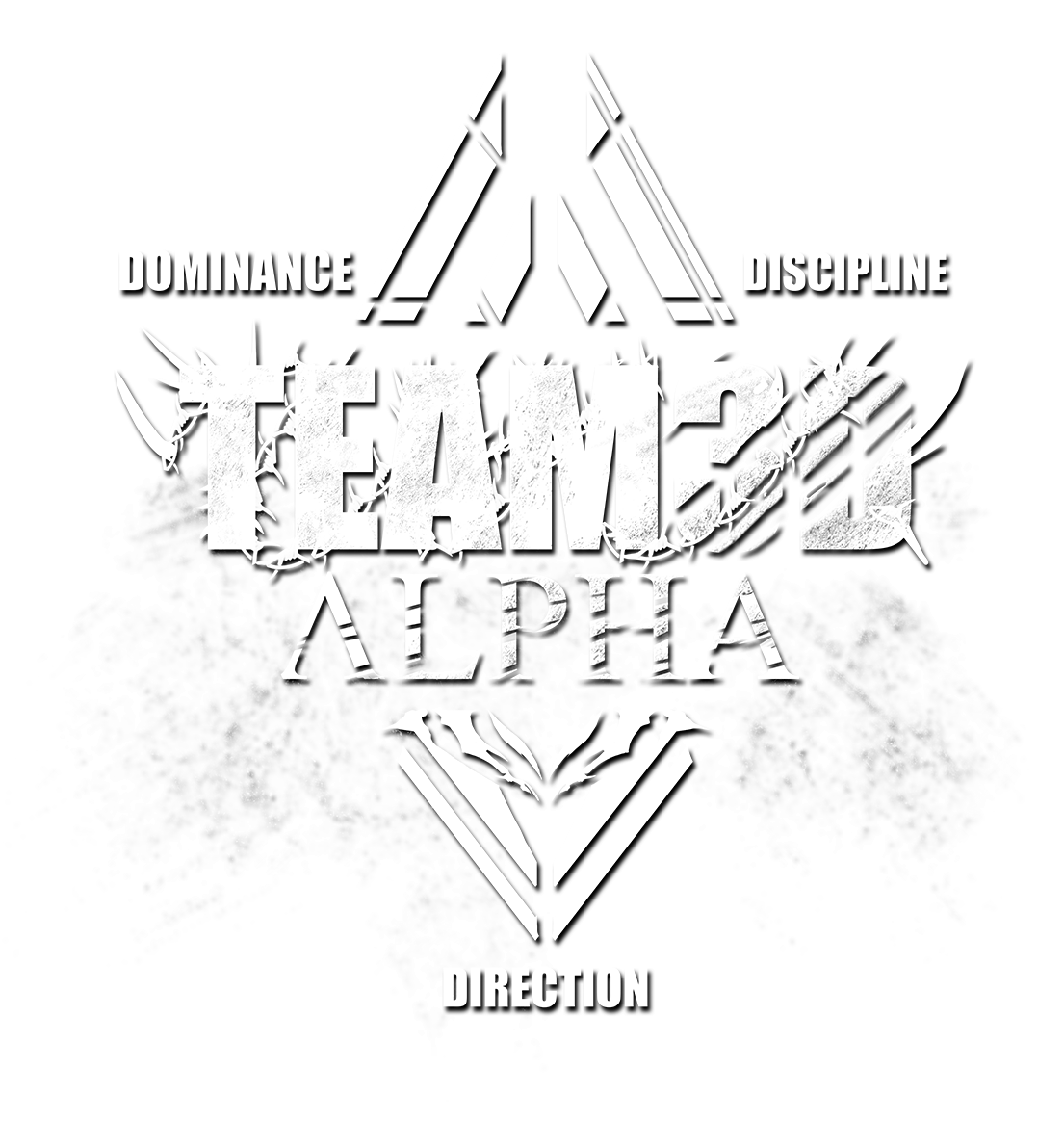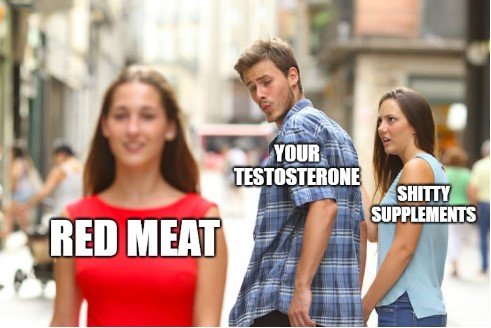42% of men dont eat enough BEEF for Testosterone & muscle growth? [Protein, Beef, & Testosterone]
Are you getting enough red meat to boost your testosterone levels? According to a recent poll on my YouTube channel, about 70% of you are eating less than 5 ounces of red meat per day, which may not be enough to maximize your testosterone, dihydrotestosterone (DHT), muscle growth, energy, fat loss, strength, and mood. Here's what you need to know to optimize your meat intake and reap the benefits of this nutrient-dense food.
Poll results for “How much red meat do you eat per day”
Low testosterone levels can lead to various health issues, including low libido, fatigue, depression, fat accumulation, and reduced muscle mass (S). While there are many factors that can influence testosterone production, such as sleep, exercise, and stress, diet plays a crucial role in providing the raw materials for hormone synthesis (S).
Among the essential nutrients for testosterone production, high quality protein and fat are the most important ones, and red meat is a rich source of both, including the most important testosterone boosting mineral, zinc (S), other potent minerals such as magnesium and selenium, and powerful vitamins such as choline and several B-vitamins.
Beef also has the highest concentration of carnitine, which has been proven to increase androgen receptors especially after training (S, S). Beef is also high in taurine, creatine, carnosine, potent amino acids such as lysine and leucine (critical for optimal IGF-1 and DHT production), and many other anabolic and androgenic nutrients that I’ll cover in future articles and videos, such as CoQ10, alpha-lipoic acid (especially in beef liver), and more.
Also, ditch the cholesterol fears, as the myth that cholesterol is “bad” for you has been debunked several times. Cholesterol is NOT deleterious to your health IF you are healthy, exercise, and eat a balanced diet (S).
In fact, cholesterol is literally the building block for ALL of your anabolic hormones, including vitamin D3 (calcitriol), testosterone, DHEA, DHT, androstenedione, and even other crucial hormones such as estradiol, pregnenolone, progesterone, cortisol and aldosterone.
Another funny thing is that the very form of cholesterol that is demonized the most (LDL cholesterol, aka “bad cholesterol”) is actually the ONE form of cholesterol that the body primarily uses to make all of your androgens.
Cholesterol is also crucial for bile synthesis (without which you cannot digest fats and absorb crucial fat-soluble vitamins such as vitamin A, D, E and K), and is also needed for proper brain function and to preserve the integrity of your cell membranes. But that’s a topic for another video.
To increase your testosterone levels naturally, you should aim to eat at least 5 ounces of red meat per day, preferably from grass-fed or pasture-raised animals, which tend to have higher levels of healthy fatty acids (such as Omega-3s), conjugated linoleic acid (CLA), and vitamin E than grain-fed or factory-farmed animals.
While some people may need more or less meat depending on their body weight, activity level, and health status, eating less than 5 ounces of red meat per day may limit your high quality protein, micronutrient, and fat intake, which can hinder your muscle recovery and growth.
Here are some tips to help you incorporate more red meat into your diet and optimize your testosterone levels:
Choose lean cuts of meat, such as sirloin, flank, or tenderloin, if you don’t have enough room in your daily macros for additional fats (you should though) or if you’re on a cut and want to reduce caloric intake. Otherwise, fatty cuts are fine and actually recommended.
Pair your meat with a variety of colorful vegetables, fruits, and whole grains to balance your nutrient intake and provide antioxidants, fiber, and vitamins.
Monitor your body composition, energy levels, mood and especially your hand grip strength (article here) regularly to see if your diet is supporting your testosterone production and overall health.
To conclude, eating enough red meat is crucial for maximizing your testosterone levels and reaping the benefits of this powerful hormone. Although the poll results show that many people are already eating some red meat, 42% are eating less than 5 ounces per day, which may not be enough to optimize testosterone synthesis unless the remainder of their diet is full of other nutrient-dense foods.
By following the tips above and aiming for a moderate but consistent intake of red meat, you can fuel your muscle growth, boost your energy, and improve your overall health. Remember, if you’re a male in the quest for self-improvement, your body deserves the best fuel possible, and red meat can be a tasty and nutritious part of your diet if consumed in moderation.
🛒If you want the BEST science-based, all-in-one training program, meal plan, testosterone guide, fat loss guide, and more, purchase my HSP Training Nucleus Overload eBook here. It combines the latest science and my nearly 20 years of experience in NATURAL Testosterone, Muscle, and Fat loss optimization to answer EVERY single critical question you may have about training, nutrition, fat loss, and testosterone boosting, using a SIMPLE, No-BS approach, and at a HUGE discount (limited time -40% off if you’re subscribed to my YouTube channel). You will also get unlimited FREE updates to ANY future editions of the eBook as a courtesy for supporting the channel and movement. Buy it now 👇
🛒If you want the BEST all-in-one training program, meal plan, testosterone guide, fat loss guide, and more, purchase my HSP Training Nucleus Overload eBook . It answers EVERY single critical question you may have about training, nutrition, fat loss, and testosterone & hormone optimization, at a HUGE discount (limited time -40% off if you’re subscribed to my YouTube channel). You will also get unlimited FREE updates to ANY future editions of the eBook as a courtesy for supporting the channel and movement.
🤵Join my social media accounts here:
📱Discord: https://discord.gg/A29dDVXVcg
📱Reddit: https://www.reddit.com/r/team3dalpha
📱IG: https://www.instagram.com/team3dalpha
📱Tik Tok: https://www.tiktok.com/@team3dalpha
REFERENCES
Isidori AM, Giannetta E, Greco EA, Gianfrilli D, Bonifacio V, Isidori A, Lenzi A, Fabbri A. Effects of testosterone on body composition, bone metabolism and serum lipid profile in middle-aged men: a meta-analysis. Clin Endocrinol (Oxf). 2005 Sep;63(3):280-93. doi: 10.1111/j.1365-2265.2005.02339.x. PMID: 16117815.
Zamir A, Ben-Zeev T, Hoffman JR. Manipulation of Dietary Intake on Changes in Circulating Testosterone Concentrations. Nutrients. 2021 Sep 25;13(10):3375. doi: 10.3390/nu13103375. PMID: 34684376; PMCID: PMC8538516.
Prasad AS, Mantzoros CS, Beck FW, Hess JW, Brewer GJ. Zinc status and serum testosterone levels of healthy adults. Nutrition. 1996 May;12(5):344-8. doi: 10.1016/s0899-9007(96)80058-x. PMID: 8875519.
Kraemer WJ, Volek JS, French DN, Rubin MR, Sharman MJ, Gómez AL, Ratamess NA, Newton RU, Jemiolo B, Craig BW, Häkkinen K. The effects of L-carnitine L-tartrate supplementation on hormonal responses to resistance exercise and recovery. J Strength Cond Res. 2003 Aug;17(3):455-62. doi: 10.1519/1533-4287(2003)017<0455:teolls>2.0.co;2. PMID: 12930169.
Zampelas A, Magriplis E. New Insights into Cholesterol Functions: A Friend or an Enemy? Nutrients. 2019 Jul 18;11(7):1645. doi: 10.3390/nu11071645. PMID: 31323871; PMCID: PMC6682969.











